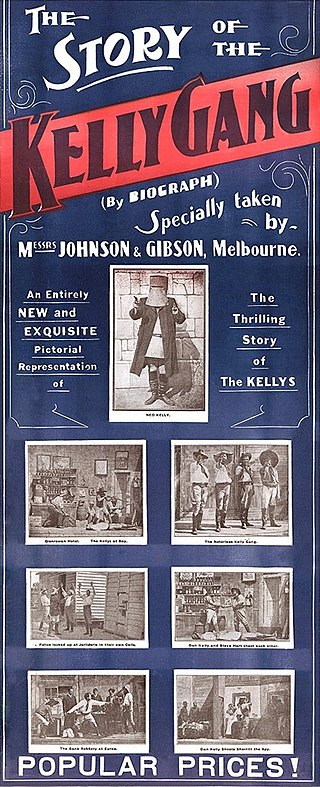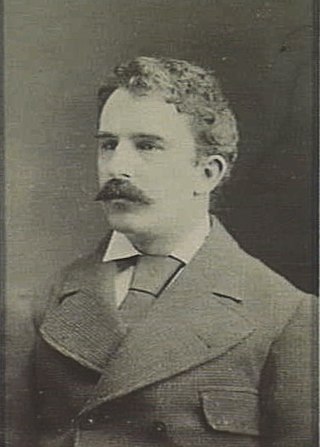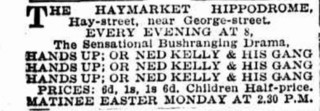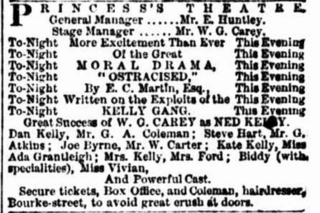
Bushrangers were armed robbers and outlaws who resided in the Australian bush between the 1780s and the early 20th century. The original use of the term dates back to the early years of the British colonisation of Australia, and applied to transported convicts who had escaped into the bush to hide from the authorities. By the 1820s, the term had evolved to refer to those who took up "robbery under arms" as a way of life, using the bush as their base.

The Story of the Kelly Gang is a 1906 Australian bushranger film directed by Charles Tait. It traces the exploits of the 19th-century Kelly gang of bushrangers and outlaws, led by Ned Kelly. The silent film was shot in and around Melbourne and originally ran for more than an hour with a reel length of about 1,200 metres (4,000 ft), making it the longest narrative film yet seen in the world.

Henry Johnson, better known by his alias Harry Power, was an Irish-born convict who became a bushranger in Australia. From 1869 to 1870, he was accompanied by a young Ned Kelly, who went on to become Australia's best known bushranger.

The Jerilderie Letter is a handwritten document that was dictated by Australian bushranger and outlaw Ned Kelly to fellow gang member Joe Byrne in 1879. It is named after the town of Jerilderie, New South Wales, where the Kelly gang carried out an armed robbery in February 1879, during which Kelly tried to have his document published as a pamphlet. It is one of only two original Kelly letters known to have survived.

Alfred Dampier was an English-born actor-manager and playwright, active in Australia.

Alfred Rolfe, real name Alfred Roker, was an Australian stage and film director and actor, best known for being the son-in-law of the celebrated actor-manager Alfred Dampier, with whom he appeared frequently on stage, and for his prolific output as a director during Australia's silent era, including Captain Midnight, the Bush King (1911), Captain Starlight, or Gentleman of the Road (1911) and The Hero of the Dardanelles (1915). Only one of his films as director survives today.

For the Term of His Natural Life was a 1908 Australian silent film based on the 1874 novel of the same name by Marcus Clarke. The film was an adaptation of James and Charles MacMahon's stage adaptation of the novel. It was the fifth Australian feature length film made and is considered a lost film.

Captain Midnight, the Bush King is a 1911 Australian silent Western film about the fictitious bushranger Captain Midnight. It was the directorial debut of actor Alfred Rolfe. The film is based on the play of same name by W. J. Lincoln and Alfred Dampier. Captain Midnight, the Bush King is now considered lost.
The bushranger ban was a ban on films about bushrangers that came into effect in parts of Australia in 1911–12. Films about bushrangers had been the most popular genre of local films ever since The Story of the Kelly Gang (1906). Governments were worried about the influence this would have on the population and bans against films depicting bushrangers were introduced in South Australia (1911), New South Wales and Victoria (1912).
The Kelly Gang; or the Career of the Outlaw, Ned Kelly, the Iron-clad Bushranger of Australia is an 1899 Australian play about bushranger Ned Kelly. It is attributed to Arnold Denham but it is likely a number of other writers worked on it.
Robbery Under Arms is a 1907 Australian film based on the popular 1888 novel. It was from the team of John and Nevin Tait and Millard Johnson and William Gibson, who had just made The Story of the Kelly Gang. It is considered a lost film.
Ned Kelly is a 1942 radio play by Douglas Stewart about the outlaw Ned Kelly.
Robbery Under Arms is a 1890 play by Alfred Dampier and Garnet Walch based on the novel of the same name by Rolf Boldrewood.

Hands Up, or Ned Kelly and His Gang is a 1900 Australian play by Edward Irham Cole about Ned Kelly.
The Inner History of the Kelly Gang is a 1929 Australian biography of Ned Kelly and his gang by J. J. Kenneally. For a time it was considered the most authorotative version of Kelly's life.

Ostracised, or Every Man's Hand Against Them is a 1881 Australian play about Ned Kelly by E.C. Martin. It was the first straight dramatisation of the Kelly story from an Australian writer although there had been one in London. The play was banned in Sydney.
Ned Kelly, the Bushranger, or The Bushrangers ; or Incidents in the Life of the Famous Ned Kelly is a 1902 Australian play by Bernard Espinasse and Harry Leader about Ned Kelly.
Outlaw Kelly is a 1899 Australian play about Ned Kelly by Lancelot Booth.
The Kelly Gang is a 1904 Australian play about Ned Kelly by Mario Majeroni.
The Kelly Gang may refer to:











